I want to record audio from microphone and save data to raw format and i find WASAPICaptureSharedEventDriven,This sample application uses the Core Audio APIs to capture audio data from an input device specified by the user and writes it to wav file. This is code:
// WAV file writer.
//
// This is a VERY simple .WAV file writer.
//
//
// A wave file consists of:
//
// RIFF header: 8 bytes consisting of the signature "RIFF" followed by a 4 byte file length.
// WAVE header: 4 bytes consisting of the signature "WAVE".
// fmt header: 4 bytes consisting of the signature "fmt " followed by a WAVEFORMATEX
// WAVEFORMAT: <n> bytes containing a waveformat structure.
// DATA header: 8 bytes consisting of the signature "data" followed by a 4 byte file length.
// wave data: <m> bytes containing wave data.
//
//
// Header for a WAV file - we define a structure describing the first few fields in the header for convenience.
//
struct WAVEHEADER
{
DWORD dwRiff; // "RIFF"
DWORD dwSize; // Size
DWORD dwWave; // "WAVE"
DWORD dwFmt; // "fmt "
DWORD dwFmtSize; // Wave Format Size
};
// Static RIFF header, we'll append the format to it.
const BYTE WaveHeader[] =
{
'R', 'I', 'F', 'F', 0x00, 0x00, 0x00, 0x00, 'W', 'A', 'V', 'E', 'f', 'm', 't', ' ', 0x00, 0x00, 0x00, 0x00
};
// Static wave DATA tag.
const BYTE WaveData[] = { 'd', 'a', 't', 'a'};
//
// Write the contents of a WAV file. We take as input the data to write and the format of that data.
//
bool WriteWaveFile(HANDLE FileHandle, const BYTE *Buffer, const size_t BufferSize, const WAVEFORMATEX *WaveFormat)
{
DWORD waveFileSize = sizeof(WAVEHEADER) + sizeof(WAVEFORMATEX) + WaveFormat->cbSize + sizeof(WaveData) + sizeof(DWORD) + static_cast<DWORD>(BufferSize);
BYTE *waveFileData = new (std::nothrow) BYTE[waveFileSize];
BYTE *waveFilePointer = waveFileData;
WAVEHEADER *waveHeader = reinterpret_cast<WAVEHEADER *>(waveFileData);
if (waveFileData == NULL)
{
printf("Unable to allocate %d bytes to hold output wave data\n", waveFileSize);
return false;
}
//
// Copy in the wave header - we'll fix up the lengths later.
//
CopyMemory(waveFilePointer, WaveHeader, sizeof(WaveHeader));
waveFilePointer += sizeof(WaveHeader);
//
// Update the sizes in the header.
//
waveHeader->dwSize = waveFileSize - (2 * sizeof(DWORD));
waveHeader->dwFmtSize = sizeof(WAVEFORMATEX) + WaveFormat->cbSize;
//
// Next copy in the WaveFormatex structure.
//
CopyMemory(waveFilePointer, WaveFormat, sizeof(WAVEFORMATEX) + WaveFormat->cbSize);
waveFilePointer += sizeof(WAVEFORMATEX) + WaveFormat->cbSize;
//
// Then the data header.
//
CopyMemory(waveFilePointer, WaveData, sizeof(WaveData));
waveFilePointer += sizeof(WaveData);
*(reinterpret_cast<DWORD *>(waveFilePointer)) = static_cast<DWORD>(BufferSize);
waveFilePointer += sizeof(DWORD);
//
// And finally copy in the audio data.
//
CopyMemory(waveFilePointer, Buffer, BufferSize);
//
// Last but not least, write the data to the file.
//
DWORD bytesWritten;
if (!WriteFile(FileHandle, waveFileData, waveFileSize, &bytesWritten, NULL))
{
printf("Unable to write wave file: %d\n", GetLastError());
delete []waveFileData;
return false;
}
if (bytesWritten != waveFileSize)
{
printf("Failed to write entire wave file\n");
delete []waveFileData;
return false;
}
delete []waveFileData;
return true;
}
//
// Write the captured wave data to an output file so that it can be examined later.
//
void SaveWaveData(BYTE *CaptureBuffer, size_t BufferSize, const WAVEFORMATEX *WaveFormat)
{
wchar_t waveFileName[MAX_PATH];
HRESULT hr = StringCbCopy(waveFileName, sizeof(waveFileName), L"WASAPICaptureEventDriven-");
if (SUCCEEDED(hr))
{
GUID testGuid;
if (SUCCEEDED(CoCreateGuid(&testGuid)))
{
wchar_t *guidString;
if (SUCCEEDED(StringFromCLSID(testGuid, &guidString)))
{
hr = StringCbCat(waveFileName, sizeof(waveFileName), guidString);
if (SUCCEEDED(hr))
{
hr = StringCbCat(waveFileName, sizeof(waveFileName), L".WAV");
if (SUCCEEDED(hr))
{
HANDLE waveHandle = CreateFile(waveFileName, GENERIC_WRITE, FILE_SHARE_READ, NULL, CREATE_ALWAYS,
FILE_ATTRIBUTE_NORMAL | FILE_FLAG_SEQUENTIAL_SCAN,
NULL);
if (waveHandle != INVALID_HANDLE_VALUE)
{
if (WriteWaveFile(waveHandle, CaptureBuffer, BufferSize, WaveFormat))
{
printf("Successfully wrote WAVE data to %S\n", waveFileName);
}
else
{
printf("Unable to write wave file\n");
}
CloseHandle(waveHandle);
}
else
{
printf("Unable to open output WAV file %S: %d\n", waveFileName, GetLastError());
}
}
}
CoTaskMemFree(guidString);
}
}
}
}
I try to save audio from buffer:
FILE* _file;
int16_t* _data;
_data = (int16_t*)Buffer;
_file = fopen("utterance", "wb +");
fwrite(_data, 1,BufferSize, _file);
fclose(_file);
output audio is so bad,To view it I use this code to plot Raw file:
import numpy as np
import matplotlib.pyplot as plt
with open ('test.raw', 'rb') as f:
buf = f.read ()
data = np.frombuffer (buf, dtype = 'int16')
L = data [:: 2]
R = data [1 :: 2]
newdata = np.squeeze(data) # Shape is now: (10, 80)
plt.plot(newdata) # plotting by columns
plt.show()
And output is this,you can it is a rectangle,the sound is very shy:
where are i wrong? Please help me!
